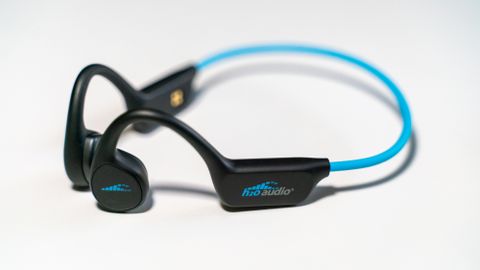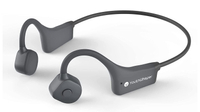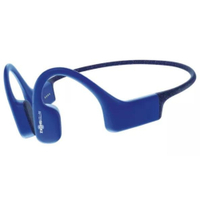TechRadar Verdict
With the highest waterproof rating and much better than expected sound quality (though music is a bit bass-y underwater), the H2O Audio Tri Multi-Sport Waterproof Open Ear Headphones give you the option of listening to whatever you’ve downloaded onto its 8GB flash memory or streaming directly from your phone via Bluetooth. We just wish the control buttons were a little less finicky.
Pros
- +
Both Bluetooth and 8GB flash memory
- +
Overall great sound quality
- +
Highest waterproof rating (IPX8)
Cons
- -
Main button controls a lot, so you need to hit it precisely
- -
Uses its own proprietary charging cord
- -
Music a little too bass-y underwater
Why you can trust TechRadar
Editor's note
- Original review date: November 2022
- Original price $149.99 (£128.00, AU$225.00)
- Price now $99.00 / £84.99 / AU$127.99
Update: February 2024. The H20 Audio Tri Multi-Sport headphones are still a great buy over a year on, even with the advent of a Pro model. Onboard storage and streaming options, a cheaper price from launch and bone-conduction tech, which hasn't really advanced much, means it's standing the test of time very well. The rest of the review remains as previously published.

H2O Audio Tri Multi-Sport: One-minute review
The H2O Audio Tri Multi-Sport Waterproof Open Ear Headphones are a contender for our best waterproof headphones guide. Thanks to their dual Bluetooth/flash memory, these headphones are so versatile you’ll only need the one set for all your workouts, whether underwater or not.
Fully waterproof, they have surprisingly good sound in most Bluetooth conditions and from the onboard 8GB flash drive for uninterrupted play while swimming. Bluetooth’s limitations in water mean you need both modes if you never want to be without sound. While you could jerry-rig a smartwatch to your swim cap or goggles, keep in mind you’ll need the two devices within three to four inches of each other.
As with most bone conduction headphones, they’re worn on the cheekbones – an improvement over the H2O Audio Sonar (one of our waterproof headphone picks) which need to be attached to swim goggles.
Our main quibble is that the control buttons sometimes need a couple of attempts to perform how we want rather than working on the first try. Of the three function buttons, the main button controls a lot, so you need to be very precise with how you hit it and how long you hold it. This should improve after the button design change in the next production run.
H2O Audio Tri Multi-Sport: Price and availability
- How much does it cost? $149.99 (£128.00, AU$225.00)
- Where is it available? Available now
- Where can you get it? Available in the US, the UK, and Australia
Interface: Bluetooth and onboard media player
Battery life: 8-9 hours play time
Storage: 8GB
Audio formats: MP3, WMA, and Apple iTunes’ M4A
Weight: 1.16 oz / 33g
Both on H2O Audio’s website and on Amazon, these versatile headphones are currently on sale at the time of writing. However, they retail at $149.99 (£128.00, AU$225.00). They’re manufactured in China and designed in San Diego, California. They ship internationally, though additional taxes and shipping fees vary by country.
It’s rare to find waterproof headphones, especially at this price, with both Bluetooth and onboard memory so you can have uninterrupted sound regardless of the conditions. For example, Shokz OpenSwim headphones have only an MP3 player (no Bluetooth) at a cost of $149.95. On sale for $89 (from $129) are the Bluetooth-only YouthWhisper SuperQ3 bone conduction headphones. While Zygo Solo headphones allow you to stream flawlessly from your phone underwater via an FM radio transmitter, it’ll cost you $299 and you need to bring extra gear to the pool.
- Value: 4.5 / 5
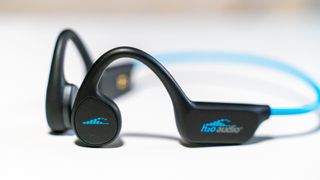
H2O Audio Tri Multi-Sport: Design
- IPX8 waterproof rating means you can swim without worry
- Stream via Bluetooth or from the onboard flash drive
- 8MB of storage of MP3, WMA and M4A files
The H2O Audio Tri Multi-sport Waterproof Open Ear Headphones have the maximum waterproofing rating – IPX8. That means they can withstand immersion in 12 feet (3.6 m) of water for an unlimited time (so you’ve lost one more excuse for cutting your workout short).
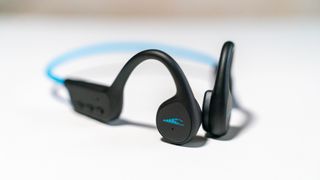
Fairly typical for bone conduction headphones, these have two round transducers that sit below your temple, hooks that go over the top of each ear, and two rectangles that sit behind your ears with the controls and battery. The device is mostly black, though you have your choice of Caribbean blue, hot pink, or black for the band that wraps behind your neck. No need to worry if you expect to be tossed around in the waves, they come with a little rubber leash to secure them to swim goggles or a wetsuit zipper. For regular wear, you likely won’t need it – they stayed comfortably in place for us during a jog and while swimming laps.
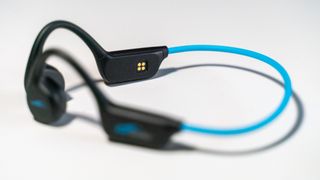
Charging the headphones and downloading files to the 8GB flash drive is through a compact proprietary cable that pairs four metal circles on each device via a magnet. While you can’t sub one of your dozens of other cords in, you don’t have to worry if water will seep into the charging port.
Once the cable connects your headphones to your computer, a window instantly pops up to transfer files. Our headphones arrived with two dozen songs already loaded, and we can attest that Janis Joplin belting out “Me and Bobby McGee” energizes for several extra laps in the pool. It’s easy to drag and drop whatever MP3, WMA, or M4A (iTunes) files you like into folders and organize them by type, workout, or however you like. Note that you can’t download files from subscription services like Spotify or Apple Music because they’re copyright protected (but you can stream them via Bluetooth).
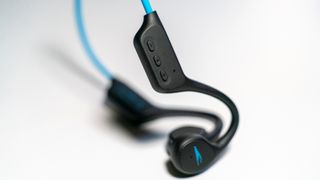
Three buttons manage the controls. With a click, two buttons raise or lower the volume; holding one skips to the next or previous track (or forward or back a few seconds on podcasts). In memory mode, a double click of a volume button skips to the next or previous folder. The main button turns power on and off, pauses and restarts play, and toggles between Bluetooth and memory. In memory mode, the main button also controls shuffle play and, in Bluetooth mode, answers calls as well as activates voice assistants.
The battery lasts eight to nine hours though playing at higher volumes will drain it more quickly. You’ll know your headphones are fully charged when their light turns from red to blue. A polite British lady announces the battery status when you turn the headphones on and she gives you an hour’s worth of periodic warnings when the battery level is low. She also confirms when you’ve toggled successfully between Bluetooth and memory modes.
- Design: 5 / 5
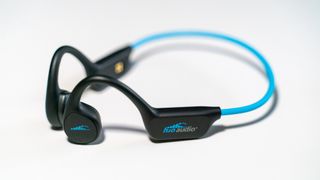
H2O Audio Tri Multi-Sport: Performance
- Easy to download to the 8GB memory and organize files how you want
- Great sound, though a bit bass-y underwater
- Button controls can be a bit finicky
Because the H2O Audio Tri Multi-sport Waterproof Open Ear Headphones stream sound two ways, you only need this one set for all your sports needs. Overall, sound quality is quite good, especially for music and podcasts, though a bit echo-y for phone calls. In the air, both music and podcasts sounded great and were surprisingly rich, whether streaming by Bluetooth or from the flash drive. Underwater, podcasts’ sound quality was just as good as in the air. For music underwater, we would have liked more treble and less bass, but it wasn’t a deal breaker (and we were happy that the bass wasn’t so strong that our cheekbones vibrated, as with some other bone conduction headphones).
Because water blocks Bluetooth signals, sound did go in and out while swimming in Bluetooth mode when our head was even just a couple of inches below the surface. The headphones performed better at the end of the pool nearest where our phone was sitting and less well 60 feet away at the pool’s other end. Keep in mind that the headphones must be in Bluetooth mode to receive phone calls.
Swimming is why you want headphones with a built-in MP3 player. In memory mode, the sound was great and didn’t cut out at all whether we swam on the surface or dived to the bottom of our four-and-a-half-foot-deep lap pool.
Our biggest complaint is that the control buttons of the H2O Audio Tri Multi-sport are a bit finicky, especially the main button which controls play, pause, toggling between Bluetooth and memory modes, and a few other functions. Sometimes it took a few tries to get the device to do what we wanted; occasionally we gave up and just pulled out our phone to get the sound to restart rather than continue to try to hold the button for the exact right number of milliseconds. Now, most people won’t do the extent of toggling and control adjustments that we do during testing, but keep this in mind if you frequently want to skip ads, pause and restart play, or switch back and forth from Bluetooth to memory mode. In circumstances when your hands aren’t free (or dry) to use the controls on your phone, make sure you’ve downloaded enough podcasts or music to the flash drive so you don’t need to toggle and then don’t touch the controls once it’s playing how you like it.
We’re told that H2O Audio is updating the design for the next production run to make the control buttons bigger so that they’re easier to press. This is likely to reduce the problem significantly.
As with all bone conduction headphones, you’ll need to turn the sound up in noisy environments because, unless you also wear the supplied earplugs, nothing blocks your ears. The open-ear design is a safety advantage – you want to hear the cyclist or car zooming up behind you or if another swimmer is trying to pass. Unlike with other bone conduction headphones we’ve tried, there was very minimal sound bleed (and, phew, no complaints from the noise-sensitive person we share home and office space with).
The 8GB storage is a fairly standard size and generally means you can store 1500 to 2000 songs. Downloading files onto the headphones was drag-and-drop easy – our biggest challenge was finding MP3 podcasts and songs in a Bluetooth world.
- Performance: 3.5 / 5
Should I buy the H2O Audio Tri Multi-Sport?
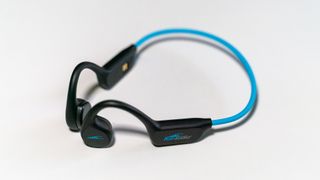
Buy it if...
You only want one pair of sports headphones
Whether you like to run in the rain, SUP, or swim, the H2O Audio Tri Multi-Sport headphones provide waterproof listening from both Bluetooth and onboard flash storage. And they’re a great price too.
You want good sound
For spoken word and, above water, for music, these headphones provide rich sound in all modes. Music is a little bass-y underwater but is still quite good. For us, it’s a fine enough compromise to be entertained while swimming. Playing from the flash memory gives you uninterrupted sound even when underwater.
Don't buy it if...
You don’t want the bother of downloading MP3s
If you only want to stream from Bluetooth, no need to buy headphones that also have a flash drive (but remember that Bluetooth’s signal is blocked underwater).
You want reliably responsive controls
The headphones’ control buttons are a bit finicky. If you frequently pause, restart, skip forward and back, or want to toggle back and forth between Bluetooth and memory, you might get frustrated that they don’t respond as you want 100% of the time. But if you simply like to listen without a lot of adjustments, the H2O Audio Tri Multi-Sport will suit you well.
You want to use them in noisy environments
Because your ears aren’t blocked with bone conduction headphones, loud external sounds might drown out whatever you’re listening to. We didn’t notice a problem when swimming, but out on the street, we needed to turn up the volume (which shortens battery life).
Also consider
YouthWhisper SuperQ3 bone conduction headphones Easy Bluetooth streaming direct from your phone (plus the ability to take phone calls), but the limitations of Bluetooth mean you’ll need to keep the headphones very near to the water’s surface when swimming.
Read our full YouthWhisper SuperQ3 bone conduction headphones review
Zygo Solo
Instead of Bluetooth, these bone conduction headphones use an FM radio transmitter (which works well underwater) to stream content from your phone. Underwater sound is great and uninterrupted, though they’re a bit pricey.
Read our full Zygo Solo review
Shokz OpenSwim
Bone conduction headphones with in-pool control and great sound for whatever MP3 audio files you’ve downloaded (though without Bluetooth for non-swimming activities).
Read our full Shokz OpenSwim review
H2O Audio Tri Multi-Sport: Report card
| Value | Especially at the sale price, you’re paying less than you would for many headphones with either Bluetooth or flash memory – and these have both. | 4.5 / 5 |
| Design | We appreciate its sleek design, both Bluetooth and flash memory, easy setup and downloading of files. | 5 / 5 |
| Performance | Control buttons can be finicky sometimes, especially toggling between Bluetooth and flash memory and sometimes for pause and play. Underwater, music had a bit too much bass. | 3.5 / 5 |
| Total | The H2O Audio Tri Multi-Sport headphones should meet the performance, design and value needs of anyone wanting completely waterproof bone conduction headphones with great sound (especially after the button redesign, which should soon be released). | 4.5 / 5 |
- First reviewed November 2022
How we test
We pride ourselves on our independence and our rigorous review-testing process, offering up long-term attention to the products we review and making sure our reviews are updated and maintained - regardless of when a device was released, if you can still buy it, it's on our radar.

Johanna Read balances life as a freelance writer/photographer specializing in responsible tourism and as a management consultant helping create healthy workplaces. Pre-pandemic, she travelled almost as much as she was at home in Vancouver, Canada. She’s keen on making life as stress-free as possible and assesses her gear accordingly. Her bylines include National Geographic, Travel + Leisure, TIME, Fodor's, Lonely Planet, Forbes, USA Today’s Reviewed, Insider, and Canadian Traveller.
